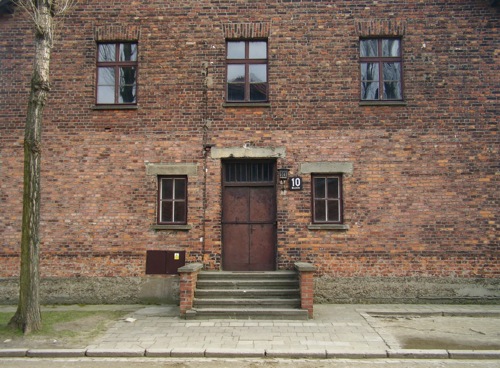
Ganon was taken to the Auschwitz-Birkenau hospital, where Josef Mengele, the so-called “Angel of Death,” conducted grisly experiments on Jewish prisoners.
Ganon had to lie down on a table and was tied down. Without any anesthetics, Mengele cut him open and removed his kidney. “I saw the kidney pulsing in his hand and cried like a crazy man,” Ganon says. “I screamed the ‘Shema Yisrael.’ I begged for death, to stop the suffering.”
After the “operation,” he had to work in the Auschwitz sewing room without painkillers. Among other things, he had to clean bloody medical instruments. Once, he had to spend the whole night in a bath of ice-cold water because Mengele wanted to “test” his lung function. Altogether, Ganon spent six and a half months in the concentration camp’s hospital.
Precisely what corrupted Mengele’s eager young mind is hard to pin down. Probably it was a combination of the political climate and that his real interest in genetics and evolution happened to coincide with the developing concept that some human beings afflicted by disorders were unfit to reproduce, even to live. Perhaps the real catalyst in this lethal brew was that Mengele, first at Munich and later at Frankfurt, studied under the leading exponents of this “unworthy life” theory. His consummate ambition was to succeed in this fashionable new field of evolutionary research.
Medicine at German universities was in any case more complementary to Mengele’s real interest in evolution, since it was taught in accordance with the guidelines of the social Darwinist theory that Hitler and a growing number of German academics found so attractive.
One of the earliest influence on the student doctor was Dr. Ernst Rudin, whose lectures Mengele regularly attended….Rudin was a leading proponent of the theory that doctors should destroy “life devoid of value.” Rudin himself was one of the architects of Hitler’s compulsory sterilization laws, which were enacted in July 1933.
…the reduced adaptation, as Darwin expressed it, does not lead to eradication, but rather the effect of natural selection has been transformed through civilization into its opposite and thus to contraselection.
The messianic quality of social Darwinism seems to have appealed to the young Mengele. His writings suggest that he was especially struck by their use of the phrase “the fate of mankind.” From his youthful encounter with their distorted ideals, to his old age, a weary and broken exile, Mengele would continue to feel a personal allegiance to the social Darwinists. At the university, the question of the “biological quality of mankind” may have been esoteric to most of Mengele’s classmates. But for him, it was apparently a clarion call.
Indeed, the ideas Mengele was so anxiously absorbing in his studies were precisely the ones that would propel him down the road to Auschwitz.
